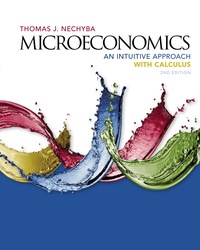=+d. Now suppose that the government imposes a tax on gasoline, and this doubles the opportunity cost
Question:
=+d. Now suppose that the government imposes a tax on gasoline, and this doubles the opportunity cost of driving both types of cars. If you were indifferent before the tax was imposed, can you now say whether you will definitively buy one car or the other (assuming you waited to buy a car until after the tax is imposed)? What does your answer depend on? (Hint: It may be helpful to consider the extreme cases of perfect substitutes and perfect complements before deriving your general conclusion to this question.)
Fantastic news! We've Found the answer you've been seeking!
Step by Step Answer:
Related Book For 

Microeconomics An Intuitive Approach With Calculus
ISBN: 9781337335652,9781337027632
2nd Edition
Authors: Thomas Nechyba
Question Posted:






